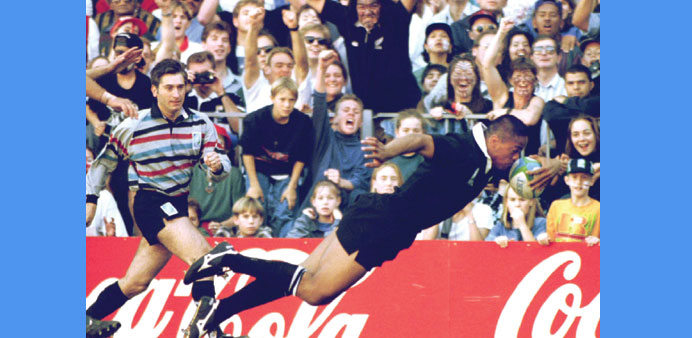New Zealand All Blacks winger Jonah Lomu goes over for his side’s first try against England during their Rugby World Cup semi-final match, in South Africa in this June 18, 1995 file photo.
AFP/Wellington
Rugby great Jonah Lomu, a pioneering global superstar whose speed and power terrorised opponents, died unexpectedly yesterday aged 40 after a long battle with kidney disease, prompting an outpouring of tributes for “a legend of the game”.
Lomu had for decades struggled with the kidney illness that cut short his playing career, but close acquaintances said his sudden death still came as a shock.
He passed away at his Auckland home, family spokesman John Mayhew said, after returning from a trip to Britain.
“It was totally unexpected, Jonah and his family arrived back from the UK last night and he suddenly died this morning,” Mayhew told TV3.
Mayhew, a former medic with the All Blacks, revealed Lomu’s family were “going through a terrible time”, before he broke down in tears.
Lomu played 63 Tests and scored 37 tries for New Zealand, rising to stardom at the 1995 Rugby World Cup in South Africa.
At his peak, the 1.96 metre (six foot five inch) Lomu weighed 120 kilograms (265 pounds) and could cover 100 metres in 10.8 seconds.
He combined the speed of a backline player with the power of a forward, creating a new template for wingers and attracting a global audience for the newly professional sport of rugby union.
Fellow legends paid tribute on social media to a player they acknowledged had a unique status.
“I am so, so devastated to hear of the passing away of @JONAHTALILOMU,” England’s Jonny Wilkinson tweeted. “The greatest superstar and just a fabulous human being. Deeply saddened.”
France’s Thierry Dusautoir said “you inspired a generation of rugby players around the world”, while Welshman Jonathan Davies hailed “a true legend and a gentleman”.
Lomu’s death was most keenly felt in his homeland, where New Zealand Rugby chief Steve Tew said: “We’re all shocked and deeply saddened at the sudden death of Jonah Lomu. Jonah was a legend of our game and loved by his many fans both here and around the world.”
New Zealand Prime Minister John Key also paid tribute to an “inspiration” and “game changer”.
“The thoughts of the entire country are with his family,” he said.
Shortly after announcing himself at the 1995 World Cup, Lomu was diagnosed in late 1995 with the rare kidney disorder nephrotic syndrome, which eventually forced him out of the international scene in 2002 at the age of 27.
Yet his spell at the top had such an impact that he was inducted into the World Rugby Hall of Fame in 2011.
The global body’s chairman Bernard Lapasset said in 2013 that Lomu revolutionised the sport at a crucial time when it was turning professional.
“He was rugby’s first professional star at a time when the sport needed media coverage and recognition from sponsors,” he said. “The conjunction of the way rugby was going pro and the way Jonah Lomu exploded on the scene was perfect for the game’s future.”
Former Wallaby Tim Horan said Lomu’s fame never went to his head and he was the first to walk into the dressing room to shake an opponent’s hand.
“His passing leaves not just a big hole in rugby, but in world sport,” Horan told Fox Sports.
Lomu remained one of the world’s most recognised and adored rugby players even 13 years after his last Test.
“He was one of those rare superstar players that transcended rugby,” South Africa, New Zealand and Australia Rugby boss Brendan Morris said.
Before his death, Lomu was in Britain for promotional work linked to the recently completed World Cup, won by his beloved All Blacks.
In public appearances he looked healthy, joking with fans and leading a rousing rendition of the haka in London’s Covent Garden.
“He looked the best I’ve seen him in many years... he just had that sparkle and that look of life in his face... I’m totally shocked,” Australian great George Gregan said.
Lomu is survived by his wife Nadene and sons Brayley and Dhyreille.

